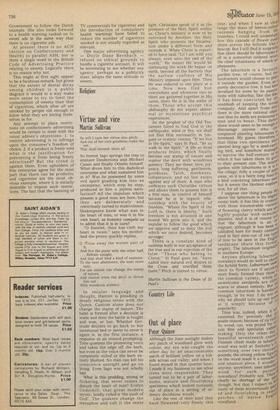Religion
Virtue and vice
Martin Sullivan
So will I turn her virtue into pitch; And out of her own goodness make the net That shall' enmesh them all.
So honest Iago springs the trap to ensnare Desdemona and Michael Cassio and finally Othello himself. What drove him to this diabolical enterprise and what sustained him in it? Was he possessed by some evil spirit goading him into an enterprise, which step by step, produced in him a joyless satisfaction? All the impulses which possess a good man are here, but they are deliberately and relentlessly turned to malevolence. Shakespeare knew what was in the heart of man, or was it in his own heart, as honesty compels us to admit that it is in ours?
"0 Hamlet, thou has cleft my heart in twain," says his mother. And the prince quickly replies,
0 'irow away the worser part of it.
And live the purer with the other half, ... Refrain tonight.
And that shall lend a kind of easiness To the next abstinence, the next more easy; For use almost can change the stamp of nature, And master even the devil or throw him out With wondrous potency.
In secular language and thought, Hamlet is pleading in deeply religious terms with the Queen. Custom alone does not change the stamp of nature. The habit is formed after a decision is made and then the battle is fought and won, or lost. Whether Gertrude decides to go back to her incestuous bed or never to enter it again is, in the first instance, a response to an inward prompting. Time quietens the protesting voice and takes the edge off the barb, but even so the voice can never be completely stilled or the barb entirely blunted. No man can kill his conscience outright and go on living. Even Iago was not wholly bad.
What is this prodding, strong or flickering, that never ceases to disturb the heart of man? Evelyn Underhill, that great modern mystic, boldly called it 'the push of God'. The quakers change the metaphor and call it the inner light. Christians speak of it as the presence of the Holy Spirit within us. Christ's ministry is now to be exercised by Another, the Holy Spirit who presents the Incarnation under a different form and extends it. When Christ is reported to have said, "Lo I am with you always, even unto the end of the world," He meant He would be continuing the work He began on earth, beyond all the barriers that the narrow confines of His Ministry imposed upon Him. Then He was reduced to one place at a time. Now men find him everywhere and whenever two or three are gathered together in His name, there He is in the midst of them. Those who accept this philosophy do not expect abnormal or mysterious psychical experiences.
As the prophet of the Old Testament failed to find God in the earthquake, wind or fire, we shall not find Him necessarily in tongues or ecstatic visions. "If we live in the Spirit," says St Paul, "let us walk in the Spirit." A life so lived produces fruits, which finally become our stamp of nature and master the devil with wondrous potency. They are these; love, joy, peace, long suffering, gentleness, goodness, faith, meekness, temperance; and no law exists against any of them. A man who embraces such Christlike virtues and allows them to possess him is a free man, in control of himself because he is in organic relationship with the source of freedom. "Where the Spirit of the Lord is, there is liberty." Such freedom is not attained in one bound. We grow into it, and the impulse to follow the good which we approve and to deny the evil which we once desired, becomes stronger.
There is a constant kind of easiness both in our acceptance of the true and in our rejection of the false. "Those who belong to Christ," St Paul goes on, "have nailed their natural evil desires to the Cross and crucified them there." Pitch is turned to virtue.
Martin Sullivan is the Dean of St Paul's


































 Previous page
Previous page